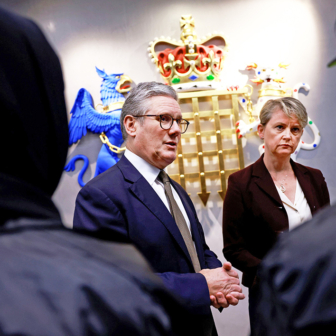IN AUGUST 2000 Australian officials deported Karim Tchoylak to his home country, Algeria. Human rights organisations were warning against deportations to Algeria and Tchoylak’s appeal for asylum was due to be heard by the Federal Court in Perth, but the deportation went ahead. The court was appalled when it learnt of the forced departure and announced that it would decide on further steps if it heard from Tchoylak within six months. By May 2001, when this time was up, nothing had been heard. The case was closed.
We don’t know what happened to Karim Tchoylak. But we do know about the circumstances that allowed his deportation to occur. He was in Australia for three years, every moment of them in immigration detention. He was detained at Port Hedland, a long way from legal assistance. He had no contacts in the Australian community and no one to tell that he was being deported. In other words, he was deported because of the policy of mandatory, indefinite detention.
Tchoylak’s case is one that springs to mind when people say, “This should never happen again.” And the chances of that sequence of events occurring in the future has been significantly reduced by the federal government’s recent changes to mandatory detention. In late July the immigration minister, Chris Evans, announced that asylum seekers will generally be held in immigration detention only as long as it takes to conduct identity, health and security checks. If they satisfy these checks they will be released. The government is also committed to increasing asylum seekers’ access to legal advice and to the Commonwealth Ombudsman.
According to the minister, federal cabinet believes “detention that is indefinite or otherwise arbitrary is not acceptable.” He acknowledged that, after sixteen years of experience, policy makers know beyond doubt that mandatory detention has “dehumanised” and “damaged desperate people.” This is not the end of immigration detention, but it is a seismic shift. After Evans’ statement, any policy maker who again ramps up large scale mandatory detention will stand accused of knowingly setting out to harm innocent people.
Evans now faces the challenge of implementing his change of direction. Mandatory detention has been a controversial policy for the department to administer, but one that it is comfortable with. Detention appeals to what the lawyer Kathryn Cronin calls the “culture of control” within the department. Under the policy of mandatory detention, the department exerted complete power over non-citizens seeking to enter or stay in the country. Individuals without a visa were incarcerated until they proved they were entitled to refugee status or produced proof that they held another type of valid visa. If they could do neither, they stayed in detention until they were deported.
In his speech Chris Evans stated that the department “will have to justify a decision to detain – not presume detention.” While alternatives to detention have become more commonplace recently, this approach will still be discomforting for a department not known for the quality of its decision making or for adjusting its procedures to suit individual circumstances.
Mandatory detention demanded little by way of decision-making prowess. Because detaining “suspected unlawful non-citizens” was mandatory, officers were not required to exercise judgement or justify their actions. Mick Palmer and Neil Comrie, who investigated the Cornelia Rau and Vivian Alvarez cases, were appalled by the department’s inability to undertake rudimentary investigations and to check facts. They were scathingly critical of the department’s “assumption culture,” which turned officers’ suspicions into actions against vulnerable individuals. They also criticised officials’ belief that acting against an individual “‘does not require a decision’ because it is required by the [Migration] Act.”
Mandatory policies and a lack of proper decision-making processes have reinforced each other within the immigration bureaucracy. It’s instructive to recall that in 1993 Margot Kingston reported in the Canberra Times that Immigration’s most senior official, Chris Conybeare, was under pressure from other parts of government to make the department accept principles of procedural fairness in decision making, something that Conybeare knew would be “very confronting for some people” in the department and galling for what he called “the old guard.” Fifteen years later, in July 2008, the Canberra Times’s editor-at-large, Jack Waterford, delivered an uncannily similar analysis. He reported that, despite the Rau and Alvarez scandals, “an old departmental culture” had survived unscathed and continued to regard immigration enforcement as “a thing in itself, outside the mainstream of administrative law and judicial review, and subject as little as possible to broader precedents about natural justice, rights of review and access to the law.”
On becoming minister Chris Evans was shocked at the number of decisions that he alone could take as the minister. In February this year he told the Senate Legal and Constitutional Affairs Committee of his misgivings about “playing God” in his portfolio. Elizabeth Proust, who completed a quick-fire review for Evans on 31 January 2008, found that previous ministers had distrusted the judicial system and had not encouraged the department’s role in decision making; she was astounded that the department had even shied away from making recommendations on cases the minister had to decide. Ministers like Philip Ruddock and Kevin Andrews kept for themselves the only real discretion in the system. With mandatory policies in place, the department was left to function like a machine.
Evans will need to come to grips with this enforcement machinery to sustain the new directions he set out. The department’s 2006–07 annual report records that 9489 non-citizens were deported from Australia in that year, mostly as the automatic result of a visa breach. Visa holders can slip quite easily from being welcome visitors, contributing to the local economy, to becoming unlawful non-citizens liable to detention and deportation. Recently, journalist Guy Healy reported that 299 overseas students have been held in immigration detention over the past three years. They include a Chinese national detained for more than a year, two other students detained for more than 100 days and the former student Motahar Hussein, released after two and half years in detention when he finally won recognition as a refugee.
There is a crying need for more flexibility. Current practices make no concession to circumstances, even when it might be opportune to show some adaptability. At the same time as the government is foreshadowing a guest worker scheme – in recognition of existing labour shortages in the horticultural industry – immigration officials are busy increasing their raids in areas in fruit and grape growing areas such as Margaret River, the NSW Riverina, Swan Hill and Robinvale.
The figures show no let up in the department’s zeal. In South Australia, for example, 408 individuals were detained as illegal workers in the first nine months of the 2007-08 financial year, more than the 406 detained in that state during the full year 2006–07. Of those 408, 241 had been deported; the rest were held in community detention or detention centres. For the full 2007-08 financial year, the department has projected a 20 per cent increase, to 1500, in the number of people that it will have detected working without an appropriate visa.
The department is also on track to increase the number of deportations using the character test in section 501 of the Migration Act. Kevin Andrews’s decision to use this section to override a court decision to grant bail to Mohammed Haneef is well known. Controversial for different reasons is the long-running case of Francesco Madafferi, with former minister Amanda Vanstone recently forced to deny allegations that donations to the Liberal Party caused her to halt the deportation of Madafferi under section 501.
But there is still little awareness of how widespread the use of section 501 has become. In 1999 Philip Ruddock amended the Migration Act so that he and the department could use the section to cancel the permanent residence status of non-citizens regardless of how long they had lived in Australia. Since then this section has been used most frequently against visa holders who have spent twelve months or more in prison. Of the more than 500 people deported under this section, most are long-term permanent residents of Australia. Very frequently they have been sent to countries in which they have not lived since they left as children. This policy runs counter to the previously accepted principle that a person should not be deported after more than a decade’s residence because by then he or she have become Australia’s responsibility.
As it stands section 501 is bad law and is poorly administered. In 2006 the Commonwealth Ombudsman released the results of an investigation into the use of the section against long-term residents, exposing the use of incomplete or erroneous information, inattention to factors in the person’s favour – such as evidence of rehabilitation – and a lack of consideration of the interests of family members being left behind. Previously the Ombudsman had been cautious in his criticisms of the immigration department but this investigation, which overlapped with the Rau and Alvarez inquiries, dramatically stiffened his attitude.
The department has tried to minimise its difficulties by creating an eerily named National Character Cancellation Centre. Established in February 2007 this centre is continuing its work under Labor, although Evans has adopted a hands-off approach. Twenty-seven visas were cancelled under section 501 in the first five months after the change of government, but only one by the minister himself. This compares with 46 cancellations by Kevin Andrews in his last full year as minister, 2006–07, and 459 cancellations by Phillip Ruddock in the three years between 2000–01 and 2002–03. (Amanda Vanstone was far less active with section 501 than her fellow Liberals and used the section to cancel only four permanent residence visas in her last full year as minister, 2005–06.) In the first ten months of 2007–08, 68 people were deported under section 501, which means that the Labor government is on target to reach the highest number since Ruddock’s stewardship.
There are often long delays in carrying out deportations under section 501 because of appeals and the need for documents from the destination country. Obtaining the requisite documents is no easy matter if the person in question has spent virtually his or her whole life in Australia. As at 12 March this year, seven individuals had been held in detention for more than 500 days pending deportation, another seven had been held between 200 and 500 days and fifteen had been held less than 200 days. All of these people had already completed their prison terms before moving into immigration detention.
Legal difficulties also beset section 501. In July 2008 the Federal Court upheld an appeal by Charles Sales against a September 2007 decision by Kevin Andrews to cancel his permanent residence. Sales migrated to Australia in 1954 when he was two years old and has remained in the country ever since. He has never had to apply for a visa, but is deemed to have received two classes of visa by virtue of legislative changes in 1992, which extended the requirement to hold a visa to all non-citizens in the country. The court held that in endeavouring to deport Sales on the basis of his extensive criminal history, Kevin Andrews cancelled the wrong visa, the one that he did not have the power to annul. Following this decision the immigration department was forced to reinstate a whole series of visas and to release numerous non-citizens from immigration detention. This is the second time in four years that this has happened. The earlier occasion, in 2005, followed another Federal Court decision, this time in the case of Stefan Nystrom, which was later overturned by the High Court.
Evans has stated that he will await the outcome of the Haneef inquiry before considering reforms to section 501. In the meantime the government has amended the Migration Act to patch up the problems exposed by the Sales decision and has again detained most of those non-citizens released in July. This is a retrograde step. It is simply bad practice for ministers and officials to cancel visas conferred without the knowledge of the recipient decades after the person in question entered the country. Such practices are bound to create legal quagmires. The problem can readily be rectified by changing the ministerial guidelines to ensure that section 501 is not used against people who have been resident in the country for more than a decade.
The new minister faces a series of challenges in improving Australia’s policies for immigration enforcement. He has conceded that these policies have done terrible damage to people in desperate and vulnerable circumstances. The direction he announced in July is promising. Evans’s historic opportunity is to move decisively away from the mandatory policies the last Labor government set in motion and to introduce fairness into the immigration system. •




